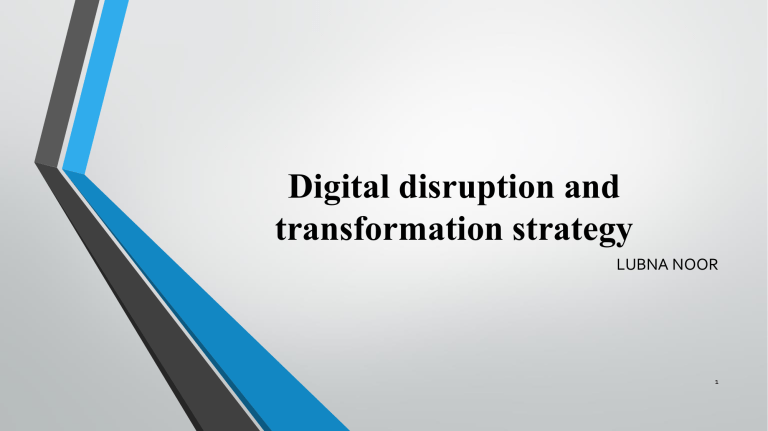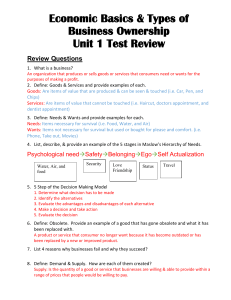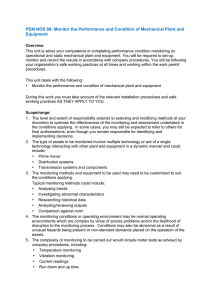
Digital disruption and transformation strategy LUBNA NOOR 1 Digital transformation • • • Digital transformation is the phenomenon of integrating digital technology into every aspect of a business, organization, or public administration, and it is happening rapidly. Digital transformation is moving the world from the physical (a world of atoms) to the digital (a world of bits). Digitalization is happening in almost every field, and businesses born out of new technologies have a competitive advantage. But for organizations with a pre-existing business model, disruption from digitalization can cause a significant loss of value. 2 Digital disruption • • Digital disruption is the change that occurs when new digital technologies and business models affect the value proposition of existing goods and services. The rapid increase in the use of mobile devices for personal use and work, a shift sometimes referred to as the consumerization of it , has increased the potential for digital disruption across many industries. 3 Elements of Digital Disruptions Business Industry Society Technology 4 The Impact of digital natives on elements of disruption Market Pricing Delivery Mechanisms 5 Digital platform • • Digital platforms have the ability to connect people, organizations and resources with the aim of facilitating the core interactions between businesses and consumers as well as assuring a greater efficiency for the business management. 6 Big data Big Data is a collection of data that is huge in volume, yet growing exponentially with time. • It is a data with so large size and complexity that none of traditional data management tools can store it or process it efficiently. Big data is also a data but with huge size. Example: • The New York Stock Exchange is an example of Big Data that generates about one terabyte of new trade data per day. Types: • • • Structured Unstructured Semi-structured 7 Artificial intelligence • • • • • • Artificial intelligence (AI), the ability of a digital computer or computercontrolled robot to perform tasks commonly associated with intelligent beings Automate and optimize routine processes to save time and money. Increase operational efficiencies. Use cognitive technologies to make business decisions. Avoid 'human error' Predict customer preferences and grow your customer base. 8 Block chain 1. 2. 3. Enhanced security Instant traceability Instant traceability 9 IOT • • • • • • As a network of interconnected devices that collect and exchange data with the system and each other via the internet. The Internet of Things can Speed up industries Increase revenue Change the way people used to work Lead to the emergence of new business models 10 Robotics and automation • • • • • A robot is a programmable machine that can complete a task, while the term robotics describes the field of study focused on developing robots and automation. Each robot has a different level of autonomy Call center operations Compliance reporting Customer order processing Employee onboarding 11 Clouds and develops • • DevOps model, development and operations teams are no longer “siloed.” Sometimes, these two teams are merged into a single team where the engineers work across the entire application lifecycle, from development and test to deployment to operations, and develop a range of skills not limited to a single function. Cloud computing is the delivery of computing services—including servers, storage, databases, networking, software, analytics, and intelligence—over the Internet ("the cloud") to offer faster innovation, flexible resources, and economies of scale. Example: • Microsoft azure 12 Extended reality • XR is an emerging umbrella term for all the immersive technologies. The ones we already have today—augmented reality (AR), virtual reality (VR), and mixed reality (MR) plus those that are still to be created. 13 DIGITAL PLATFORM TYPES OF DIGITAL PLATFORM AGGREGATORS • • • Integration Build Extend SOCIAL PLATFORMS • • • Ad Based Model Franchise Model Subscription Model MOBILIZATION 14 Business model Subscription model • A subscription business model can be applied to both traditional brick-and-mortar stores and e-commerce businesses. Example: Many local farms offer farm shares or community-supported agriculture subscriptions, where clients get access to fresh produce on an ongoing basis while crops are in season. 15 To be continued Franchise model • • A franchise is an established business blueprint that a franchisee purchases and reproduces. The franchiser, or original owner, works with the franchisee to help them with financing, marketing and other business operations to ensure the business functions as it should. In return, the franchisee pays the franchiser a percentage of the profits. Example: Domino’s, Anytime Fitness and Ace Hardware are all examples of the franchise model. 16 To be continued Ad Based Model • Online businesses and media companies often look to advertisers for most or all of their revenue. This is known as an advertising-based revenue model. 17 THANK YOU 18

